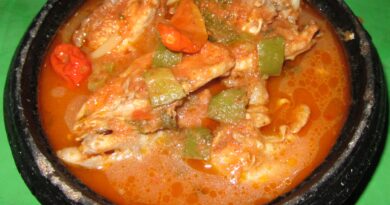Nkwobi
Nkwobi: A Culinary Journey into the Heart of Nigerian Cuisine
Introduction:
Nigerian cuisine is a vibrant tapestry of flavors, textures, and aromas, reflecting the rich diversity of the country’s culture. One dish that stands out among the array of Nigerian delicacies is Nkwobi – a delectable traditional Igbo dish that has captured the hearts and palates of many. In this article, we will delve into the origins, preparation, and cultural significance of Nkwobi, exploring the unique blend of ingredients that make it a true culinary masterpiece.
Origins of Nkwobi:
Nkwobi traces its roots to the Igbo people of Nigeria, specifically to the southeastern region. The dish has evolved, with various communities adding their twists and adaptations. Originally served during special occasions and celebrations, Nkwobi has gradually become a popular choice for both locals and visitors alike, earning its place as a staple in Nigerian gastronomy.
Ingredients:
At the core of Nkwobi’s allure is its distinctive combination of ingredients, each contributing to the dish’s unique flavor profile. The primary ingredient is cow’s tripe, also known as shaki, which forms the base of the dish. Other essential components include utazi leaves, onions, pepper, and a generous serving of palm oil. Seasonings such as crayfish, stock cubes, and salt are added to enhance the overall taste, creating a symphony of flavors that dance on the palate.
Preparation:
Nkwobi is as much about the meticulous preparation as it is about the ingredients. The process involves cleaning and parboiling the cow’s tripe to remove any impurities and soften the texture. Once prepared, the tripe is then seasoned with a blend of spices, including ground crayfish, salt, and stock cubes. The mixture is set aside to marinate, allowing the flavors to meld together.
In a separate pot, palm oil is heated until it reaches a specific temperature, imparting a rich, deep red hue to the oil. Chopped onions are added, sautéed until golden brown, and then mixed with the marinated tripe. Utazi leaves, with their slightly bitter taste, are finely chopped and incorporated into the dish, balancing the overall flavor profile.
The final step involves the addition of pepper, which brings a subtle heat to the dish. The result is a tantalizing blend of textures and tastes – the tender tripe, the earthy palm oil, the aromatic spices, and the fiery kick of pepper, all working in harmony to create a truly unforgettable culinary experience.
Cultural Significance:
Nkwobi is more than just a dish; it is a cultural symbol, representing the warmth and hospitality of the Igbo people. Traditionally served in a communal setting, Nkwobi is enjoyed with friends and family, fostering a sense of togetherness and unity. The dish is often accompanied by cold beverages or traditional palm wine, adding to the convivial atmosphere of the gathering.
In Igbo culture, Nkwobi is frequently associated with celebrations, such as weddings, birthdays, and festivals. Its presence on the dining table signifies abundance and prosperity, making it an integral part of festive occasions. The communal nature of sharing a plate of Nkwobi reinforces the bonds between individuals, emphasizing the importance of community and shared experiences.
Variations and Adaptations:
As with many traditional dishes, Nkwobi has seen various regional adaptations and personal touches. Some variations include the addition of different spices, vegetables, or proteins, reflecting the diverse culinary landscape of Nigeria. While the core elements of cow’s tripe, palm oil, and utazi leaves remain constant, the creativity of cooks and chefs has led to a myriad of interpretations, each with its unique twist on this classic dish.
Conclusion:
Nkwobi stands as a testament to the richness and diversity of Nigerian cuisine, offering a sensory journey into the heart of Igbo culture. Its bold flavors, combined with the communal aspect of sharing, make it a dish that goes beyond mere sustenance; it is a celebration of tradition, community, and the joy of coming together over a shared meal. As Nigeria continues to make its mark on the global culinary stage, Nkwobi remains a shining example of the country’s vibrant and dynamic food culture, inviting all who taste it to join in the celebration of flavors and traditions.



